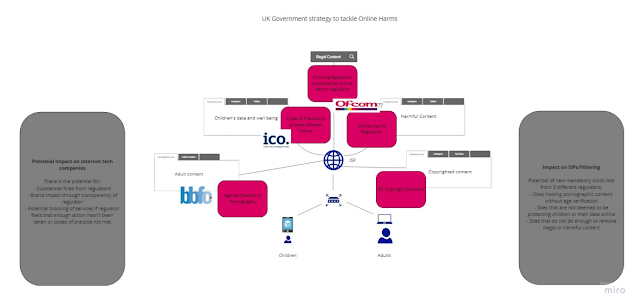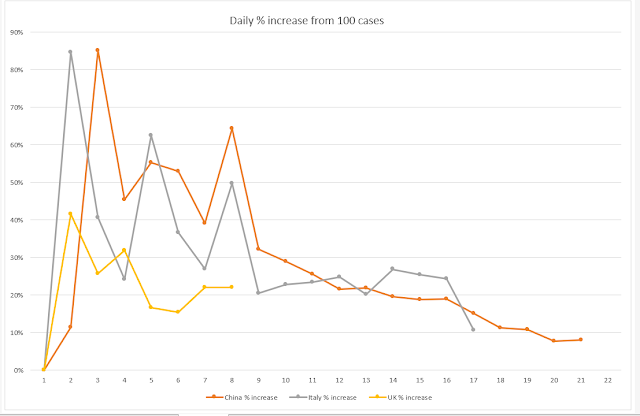World War I - Chapter 1. The UK Strikes Back
World War Internet is coming, we are on the brink
of changes in both legislation and technology that are going to change the way
that we use the internet - both in our personal and work life.
Now when you hear World War Internet, you may be
thinking of the hackers of countries frantically trying to hack each other's
national infrastructure or trying to steal state secrets. In reality the
battles of the internet are being fought between countries and the tech giants
that have made the modern internet what it is today.
Nations around the world are desperately trying to
claw back control over the internet in their countries with varying reasons but
ultimately, they need to wrestle back the power and influence that companies
like Facebook and Google (amongst others) have over their population.
It looks like the UK will fire the first meaningful
shot against the tech giants with a combination of legislation that will
endeavour to protect their citizens from Online Harms. Over the past 2
months we have seen consultations/development for 4 different pieces of
legislation and directives that aim to "make the UK the safest place to be
online":
·
The Online Harms White
paper, setting out the plans for world leading package of measures to keep the
UK user safe online.
·
The ICO have launched
a consultation for the code of practice to help protect children online
·
Article 13 of the EU's
new copyright directive holding platform providers to account for copyright
infringement on their platforms (Putting Brexit aside for now as the UK
government have already suggested that they will enshrine this into UK law)
·
The UK government
announcing the date for their long-awaited plans for age verification of
pornographic material
So, what are the UK government hoping to get out of
these developments?
Online Harms White Paper
The Online Harms White Paper sets out the plans
from the UK government to tackle the issue of illegal and harmful content
online as public concerns grow and every day we see the impact of this content
on people around the world - including the most vulnerable children.
The main aim is to tackle the content and activity
that threatens national security or the physical safety of children.
Whilst there are already a number of initiatives in place, driven by
organisations such as the Internet Watch Foundation, government agencies
such as the National Crime Agency (via CEOP) and CTIRU (Counter Terrorism
Internet Referral Unit) - it is deemed that this activity alone is not enough
to disrupt the prevalence of illegal and harmful content appearing across
social media platforms or hosting providers.
The white paper sets out plans to appoint an
independent regulator that will produce codes of practice for technology
companies that allow their users to share or discover user generated content or
interact with each other online. Whilst the immediate link is with social
media companies, it also extends to file hosting sites, public discussion
forums, messaging services and search engines - covering the large majority of
how the public uses the internet today.
It is worth noting here that whilst the social
media companies tend to hit the headlines when their platforms are used, for
live streaming of atrocities for example - the recent annual report from the
Internet Watch Foundation indicated that a relatively low proportion of illegal
child abuse imagery is found on these platforms - it is far more likely to be
found on file hosting sites that are beyond the eyes of content moderation
tools and in countries outside of the UK. In fact, less than 2% of this type of
content is found in the UK. The biggest issue is that the UK is one of
the biggest demand generators for this kind of content, it is unlikely that the
online harms regulator is going to have any impact on that which may call for a
wider piece of work that stretches beyond the scope of the internet.
Are social media companies unfairly taking the all
the heat?
Yet despite the numbers suggesting that the big
names in social media aren't the main culprits when it comes to the illegal
content, articles such as this from the BBC https://www.bbc.co.uk/news/uk-48236580 highlight that they are still the major focus and called upon to solve
the world problems of the internet, but is it their place to do? They should
absolutely be accountable for cleaning up their own platforms and reducing the
risk of harm to their users, but they can't be held entirely responsible for
areas such as indecent imagery of children when the facts show that their
platforms are not hosting these images in the main.
Are they being targeted because they are in plain
sight, because their brands are important to them and they will do whatever is
necessary to protect their reputation? Just look at how Facebook have
spent millions of dollars in a PR campaign to demonstrate that they take
privacy seriously. It's far easier to target these organisations and make
it look like the issue is being tackled than trying to regulate those that hide
in other countries and who do not require a public brand to be
successful. It will be interesting to see how the government intend to
measure the success of the regulator as this could be a job that can never be
successfully achieved beyond the headlines about the impact on technology
giants.
But this white paper and the plans are not just
about illegal content, as pointed out earlier there is already a lot of
activity in this area - it is also about harmful content and activity that is
not illegal but can have equally devasting impact on all members of the
public.
Their vision is:
● A free, open and secure internet
● Freedom of expression online
● An online environment where companies take effective steps to keep
their users safe, and where criminal, terrorist and hostile foreign state
activity is not left to contaminate the online space
● Rules and norms for the internet that discourage harmful behaviour
● The UK as a thriving digital economy, with a prosperous ecosystem of
companies developing innovation in online safety
● Citizens who understand the risks of online activity, challenge
unacceptable behaviours and know how to access help if they experience harm
online, with children receiving extra protection
● A global coalition of countries all taking coordinated steps to keep
their citizens safe online
● Renewed public confidence and trust in online companies and services
There will be an emphasis on the technology
companies to do more themselves to prevent illegal and harmful content or
conduct appearing on their platforms rather than relying on outside agencies to
highlight this content or activity. There is also an emphasis on allowing
the public to highlight and call out inappropriate or illegal activity in an
easy way that will lead to the removal in and fast and efficient manner.
There has been criticism of the plans for
regulation, suggesting that these regulations will only make the current tech
giants more powerful as they are the only companies that can realistically
afford to enforce moderation at this scale. But there is a reason why
Facebook employ 30,000 moderators worldwide - because they have a huge number
of users and content being posted every second. Smaller companies won't
have the problem at this scale and advancements in regularly available
technology can reduce the need for human intervention - scaling to the
requirements based on volume.
The government are trying to create an environment
where the public does not accept harmful activity online, creating a culture of
calling out this kind of activity but recognising that when this is often done
today, there is a lack of action on behalf of the technology companies to
tackle all but the most extreme or illegal activity.
Some of the most popular social media platforms aren't
waiting to be told what to do, Instagram have been trialling some new features
that give users a gentle warning that they may be about to post something that
may be hurtful to others. Whether this type of gentle nudge will make a
significant change in user behaviour is yet to be seen and will not be enough
on its own - but it may make enough of a difference to those who's normal offline
behaviour would not intend harm to others, challenging their conscience
to think twice about their actions.
If successful, this may well be a global first and
potentially a framework that can be replicated around the world. But it
is not without its challenges:
·
The independent
regulator is going to have the difficult role of deciding what is harmful and
what is someone exercising their freedom of speech. There is a huge grey
area here that will split opinions and raise concerns with organisations such
as the Open Rights Group who are already expressing concerns about censorship
of the internet with existing programmes from CTIRU for example
·
There is a question
mark over how much these platforms can actually do to prevent harmful content
appearing, particularly in the context of live streaming where you can't
predict what a user is going to broadcast - we are not yet in the realms of
technology enabling a Minority Report approach to crime. Therefore, they
are always going to be reacting and playing whack-a-mole with this kind of
content as it is broadcast and shared in seconds across the world
Who will the regulator be?
It is yet to be determined but OFCOM look like they
are hiring for people that might be useful for this kind of regulation so I
wouldn't be surprised if Online Harms was taken under their remit.
What power will the new regulator have?
The new regulator will have the power to issue
fines to these platforms and hold their board members legally accountable if
they are not thought to be taking sufficient steps in reducing Online Harms on
their platforms.
Whilst these companies are used to the threat of
fines, particularly in the context of data protection - these changes could see
fines coming at them from various regulators and the cumulative financial
impact could be huge.
They will also have the power to demand that UK
ISPs block access to certain platforms, this would be a pretty bold move
against the tech giants but I would imagine would only be enforced in extreme
circumstances where platforms have been persistently warned about the content
hosted and their inability to
Whilst the UK government are the first to try and
tackle this in a meaningful way, they are of course not the first government to
want control over the content that their citizens can access - the infamous
Great firewall of China has been doing this for years and hence why privacy
campaigners have been campaigning against some of the proposed legislation in
fear that Big Brother (aka the UK government) is going to be restricting free
speech and censoring the internet for its own objectives - only allowing
internet users in the UK to see what they want them to see. This
isn’t the first time that the UK government has been questioned over its
approach to online privacy with the European Court of human rights declaring
the UK government's surveillance regime a violation of the human right for
privacy and freedom of expression.
There have also been more recent cases where governments
have taken a tough stance, a great example being the Indian government who
recently banned TikTok from being downloaded from Google Play and the Apple App
Store due to concerns about the platform hosting content of child exploitation
and pornography. Whilst this has been challenged by the Japanese company
that owns the platform, this demonstrates how some governments will take a hard
line to protect their citizens and the reputation of their country.
Whilst the UK government is taking a slightly
softer approach, the warning in the white paper is clear - the proposed
regulator for online content will have the power to demand all UK ISPs block
any platform that is not conforming.
The recent Sri Lankan terrorist acts also prompted
the Sri Lankan government to effectively "turn off" Facebook across
the country to prevent the sharing of videos of the acts as well as attempting
to prevent further reprisals aimed at the Muslim communities in the country.
Whilst this kind of action might be considered a minor inconvenience in the UK,
in Sri Lanka Facebook is the main channel in which internet users communicate
and get news - for some Facebook is the internet so turning it off is like
turning off the internet.
So, is there a balance between protecting the
internet users in the UK from online harm, privacy concerns and censorship?
Whilst there are concerns from the privacy groups
already mentioned, there must be a line drawn somewhere and it is clear that a
laissez faire attitude to the tech giants has had an enormous impact on
democracy, mental health and the access of illegal or harmful content.
For all the concerns about the social media giants, it is clear that they have
no desire to have their platforms play a part in any negative activities in these
areas either - but as commercial organisations there is always going to be a
challenge for them to maintain their profit margins whilst keeping their users
safe from online harms, particularly in a world where every country will have a
different view on what is acceptable and even what it is illegal.
Social media hits the headlines for the wrong
reasons in every atrocity that occurs globally, from the US to New Zealand to
Sri Lanka. It is clear that governments around the world do not trust the
platforms to be able to control the content they host or the platform they
provide to those that wish to do wrong and with good reason - we are yet to see
any of them demonstrate how they intend to do this beyond manual reporting and
review helped by relatively simple algorithms which are in no shape to deal
with the volume and increasingly blurred lines of what is illegal vs harmful.
The experimentation by Instagram could be an
indicator of the way that these platforms may need to adapt to encourage their
users to be more responsible. This obviously will not be a
silver bullet though, one of the reasons people behaviour differently and
potentially more hurtful online is that they can benefit from anonymity and all
the time that they can hide behind that anonymity they will continue to behave
in a way that they would not do offline.
A bold move by any regulator would be to make
anonymisation obsolete, could the new age verification for pornographic content
be a precursor to identity verification for any online service? Whilst
there would be many objections from data privacy groups and concerns over a
"big brother" approach from the government - it would certainly have
a massive positive impact on user behaviour on these platforms (not to mention
a reduction in the number of accounts boasted by the platforms).
In the next chapter I'll look at the ICO's new code of practice for age approriate design.



Comments
Post a Comment